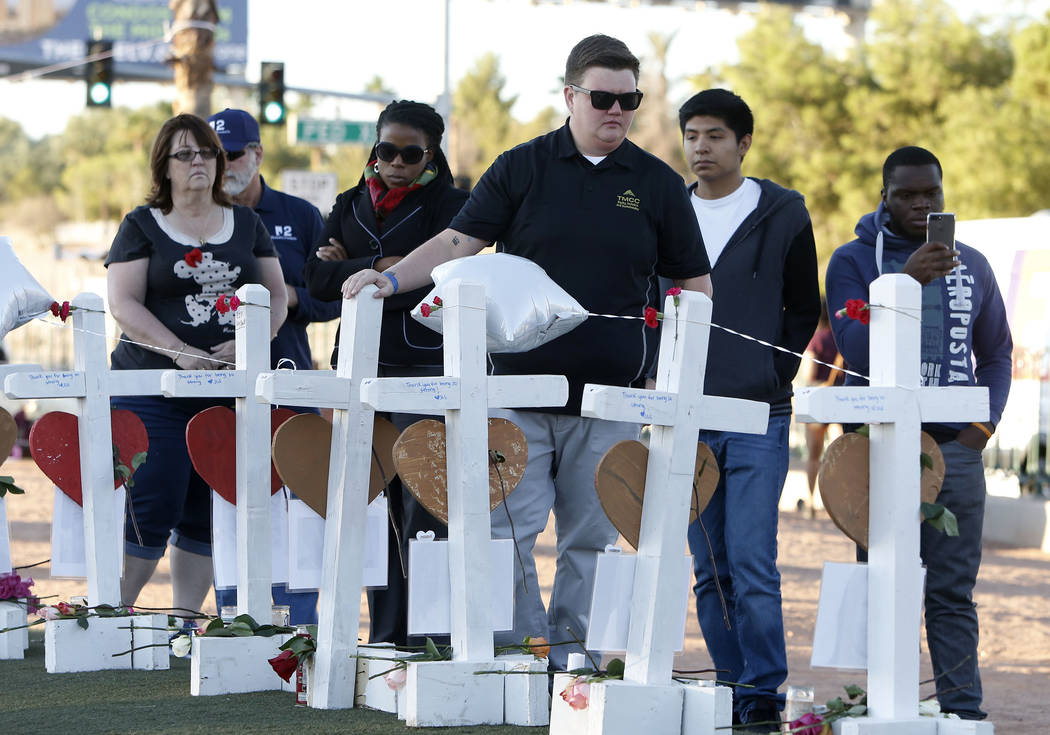
If there’s a situation in which the sentence “I can’t imagine it” works, it was this one.
When I spoke with a colleague who was at the concert, she mentioned problems that had never occurred to me. She was there with a friend and she said they never realized the gunfire was coming from overhead. “We just assumed it was on the ground,” she said.
Ground level gunfire can be blocked by hiding behind things, but not if the shots are coming from above. At different times they hid behind a truck and an overturned table in the press tent. “Some guy came up, and told us, ‘No, no, no.’ He lifted up the tent.” They crawled out and he gave them a ride to safety.
The things we don’t know dominate this latest mass killing, and what was in the killer’s head heads the list.
Donald Trump, as usual, leaped ahead of the available information and called it an “act of pure evil,” which recalled the case of Texas tower killer Charles Whitman in 1966, who an autopsy showed had a large tumor in his brain that a medical commission concluded could have affected his behavior. Sometimes evil deeds do not flow from evil intent. Religion reporter Daniel Burke said that “as writers and thinkers of every age have found, evil eludes easy answers.”
Assumed killer Stephen Paddock was a professional gambler. State gambling regulators are plowing through records of Paddock’s gambling, which raises the issue of whether they are competent to do the job. Should it be social psychologists or criminologists, or both? And won’t state officials be more interested in protecting the reputation of the state’s biggest industry than in finding out what those documents mean?
Perhaps it was because it happened in our state, or because the death toll was so large, but it feels like this incident was different, that there is a sea change in how people are reacting to them. But among the things we don’t know is how frequently they are happening.
“Since Orlando, at least 585 people have been killed and 2,156 have been injured in mass shootings,” the New York Times reported. But that depends on one definition of a mass killing, and there is disagreement on that. Politico argues they are not happening more frequently but with greater death tolls. Notice also that some incidents can be referenced solely by mentioning the city. No additional explanation is needed.
Death seems to be closing around us, with more violent people emboldened. Six days after the Las Vegas murders, a Canadian newspaper was interviewing Arizona gun control advocate Jennifer Longdon about Las Vegas when she received a text.
It informed her there had been another mass killing, this one in Arizona, with four dead and two suspects. Longdon herself had been paralyzed when she was shot by a stranger in a road rage incident. Three violent incidents are referenced in that single insignificant anecdote.
Nor do we know enough about gun control, in part because Congress has enacted legislation discouraging research. Some federal employees avoid that field of research because they worry they will be fired.
Some people avoid talking about the topic because it’s too much trouble or too hazardous politically. In 2012, a committee was formed to advise the Nevada Legislature on “various aspects of the state’s criminal justice system” and make recommendations. It voted not to even discuss assault weapons.
It is easy to forget that this has happened before in Nevada, though without guns. On Thanksgiving Day 1980, a woman named Priscilla Ford drove a Lincoln Continental down the crowded sidewalk of Reno’s main street in front of several casinos. Six were killed, 23 wounded.
In that incident, it was easier to get a handle on everything, because the fragile mental state of Ford made a search for a motive less fruitful or necessary – and because the sensitivities of gun politics did not get in the way.
Dennis Myers is an award-winning journalist who has reported on Nevada’s capital, government and politics for several decades. He has also served as Nevada’s chief deputy secretary of state.